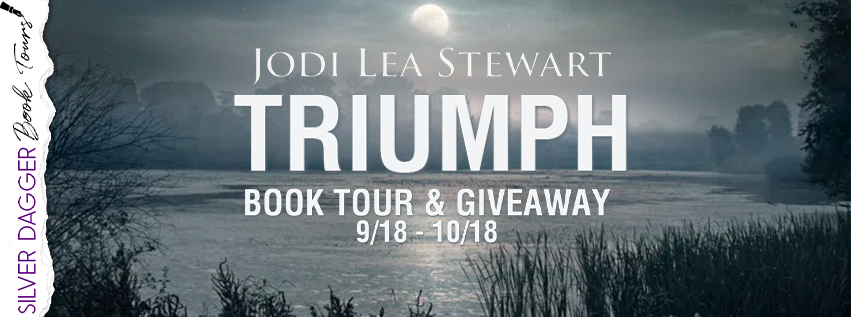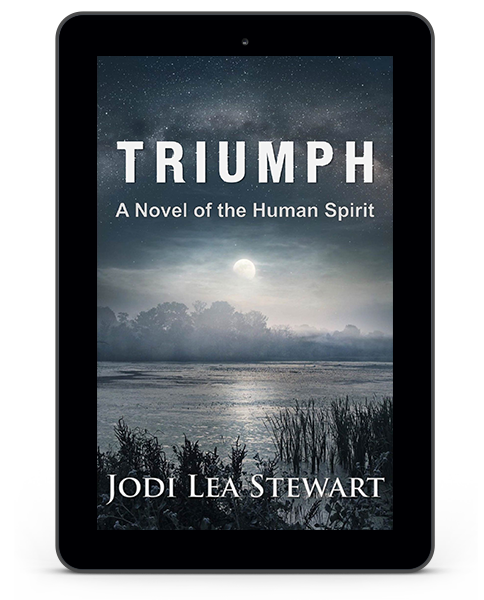Seething with old prejudices, wealth, poverty, voodoo, and young hot blood, TRIUMPH, a Novel of the Human Spirit will take you through the Louisiana swamps, New Orleans, the Texas prairies, and into the bustling but racially troubled city of St. Louis in the mid-twentieth century . . . and lead you to a place where people are accepted because of character and heart—nothing more, nothing less.
Triumph
A Novel of the Human Spirit
by Jodi Lea Stewart
Genre: Historical Fiction
At a time when the world needs more warmth and acceptance, two little girls – Mercy and Annie, take us on a journey where color doesn’t matter, and character and heart are the only things that do!
Deep in the Louisiana swamps, 1903, five-year-old Willy is kidnapped by a Vodou Priestess. One day, he will fight bloody battles in France and come face-to-face with the horrors of Vodou.
1903
Flo’s piercing screech cuts the air like a sharp axe. “Simon-man, pull up on those mules for gawd’s sake!” she cries.
“Whoa there, Gabriel. Easy now, Michael. Su-su-su, boys,” utters the man called Uncle Simon by four of the six kids in the buckboard. He pulls the lead reins tight, resting them across his lap. He turns to gaze at Flo sitting in the seat beside him and swipes a hand with neatly trimmed fingernails over the beads of perspiration on his dark forehead.
“My soul, you scared me, woman. I thought Doctor John himself was come back to life.” He chuckles in uneasy relief. “Or, for a minute, I was thinking, maybe, well… you know who had figured out some things, and—”
“Shush now. It’s gettin’ dark time, but I knows I seen a woman over to there by those trees.”
Simon rises to his feet, his neck stuck out like a gander eyeing a snake. His eyes canvas the trees slouched over the narrow trail before them. “Zeke, hand me that lantern up here, won’t you, sir?”
Zeke, thirteen but growing fast out of his britches and shirts and appearing mostly to be grown, hands the lantern he fired up minutes before around the side of the buck seat to Simon. Simon’s nerves are already taut from driving the buckboard wagon over the checkerboard ground greedily hoarding space between the swamps, marshes, and Lake Pontchartrain. Everybody knows that kind of ground isn’t wholly stable, but Flo asked for a little drive-about for the kids before he left tomorrow morning on the train back to New Orleans.
Flo, with her exotic eyes and shapely form, gets about everything she asks for, and then some, and Simon finds that to be a pride unto himself.
Water mosquitoes ramp up their hungry search for blood as Simon strains to see through the humid tar of dusk slurping up the wagon and its occupants like a hungry towel. Five other kids besides Zeke jumble around in the back of the small buckboard to see what’s causing the excitement. Curious eyes stare into the gloom spreading across the watery cypress as a pale moon rises over moss-swathed oaks on the shore. Hands slap at the carnivorous insects diving toward their skin for nourishment.
“There she is, Mama, by the black water!” Zeke shouts.
He and Flo jump from the wagon to the ground. Zeke takes the proffered lantern from Simon while Flo directs a silent finger at the small horde of squirming youngsters, warning them to stay put. As soon as her back is turned, they scale the wooden sides to the ground—delirious mice abandoning a ship long at sea.
Simon’s gentle reprimands never make it past the toe board at his feet. He patiently climbs from the wagon and trudges toward the stranger standing in the lush St. Augustine grass spreading like a carpet from the banks of the water. He patiently climbs from the wagon and trudges toward the stranger standing in the lush St. Augustine grass spreading like a carpet from the banks of the water. An ancient crape myrtle burdened with fuchsia blossoms frames the unmoving figure standing before them. Zeke’s high-held lantern casts a ghostly light over a brown-skinned woman of great beauty. She is swaddled in a pale-lilac shawl from her neck to below her knees. Her arms hold a rolled blanket about equal in size to a small log. Her hair is arranged high on her head and fastened in place with pins of creamy ivory. Red ribbons loop through her locks.
A surge of sickness invades Simon’s belly as buried reminiscences dance on the edge of his mind. The woman mumbles incoherently in soothing tones to the blanket, sporadically covering it in tender kisses. Flo frowns at Simon, then looks back at the stranger. “Honey-girl, you be all right?” she asks softly.
The woman ignores her spectators, smiles at the blanket, crushes it flat to her breast. She commences a slow rotation, lifting her eyes to fall long seconds upon each person as she turns. She traps Simon in her gaze the longest, coagulating the air in his lungs. Long-forgotten memories creep from a deep pit in his subconscious. He swabs the rolling sweat from his face with a sleeve.
“Fl-Flo, we best be getting on-on back to R-Ruddock. It’s g-g-getting late out here, and these young’uns n-n-need to be tucked in their beds.” Simon coughs in his hand. “We’re l-leaving now, ch-children.” He turns toward the buckboard. The woman strikes up a humming rhythm replicating the cadence of a drum. Simon stops, turns back around.
Flo, confused about her Simon-man’s stuttering, shoots him a questioning look he doesn’t see. She steps nearer the woman. “Come on, chile, let us bring you to town. Us womens’ll help you with whatever’s ailing yer purty self. We gots our medicines to heal yer heart and yer body, as well. Let’s go now, honey. We understands how it feels to lose a little baby not barely in this world yet.”
The woman seems not to hear Flo. Her feet move rhythmically, slowly—mesmerizing the onlookers. She gazes into the sky. Undulating. Singing.
Danse Calinda, boudoum, boudoum.
Danse Calinda, boudoum, boudoum.
Molten terror blossoms inside Simon, spreading hot into his arms and legs. The children sneak closer to gaze at the spectacle before them. Simon visualizes grabbing hold of his two children and the other four who call him Uncle Simon as an eagle hooks a fish to safely wing into the heavens, but he cannot move.
The woman sways side to side. She flicks her hand across her left shoulder. The swaddling shawl falls to the ground. She stands before them wearing a flimsy strip of material tied to her waist and dropping barely past her buttocks. Layers of gold chains hang from her neck and spread over her naked bosom. Her eyes gleam as she writhes and sings.
Eh! Eh! Bomba, ben! Ben!
Canga bafio, te,
Canga mou ne de le,
Canga do ki la,
Canga li!
Trapped by the gossamer web spun by the woman’s beauty and peculiarities, the captive audience stares as she stops moving. For a few frozen moments, she deliberately gazes at each one. She tilts her face upward and shrieks, a strange animal sound. She tosses aside the empty blanket, bends to scoop up five-year-old Willy as though he is weightless, and dashes toward the brackish water of the estuary. She makes a sharp turn toward the swamp waters.
“My baby! Give me back my baby!” Flo shrieks, the heavy darkness quickly gobbling up her cries. Her screams shock the troupe from their trance-like stupor. One by one, they take to their legs.
“Mama! Mama! Mama!” Willy shouts.
The woman vanishes behind the curtains of Spanish moss draping the trees along the water bank. Her feet splash into the water. Willy screams.
Then, silence.
In moments, the agonizing quiet surrounding the band of confused people is filled with a cacophony of frog croaks and cricket chirps. A black-crowned night heron emits a barking-squawk complaint from a nearby tree.
Simon, running fast, reaches the water’s edge and strains to see through the darkness. He cups his hands. “William! Willy-Boy! Where are you, son?”
An insect ensemble begins strumming nocturnal melodies across the calm waters before him, rendering his soul bloodied and bare. He sinks to his knees, lost in an agony for which there are no words. Flo witnesses his collapse. She falls beside him onto the damp earth.
The wails of her other five children rise like a pillar to the cold moon eyeing the scene below.
Editorial Reviews
Review
*5-star rating by
K.C. Finn, Reviewer with "Reader's Favorite"*
* Five Stars for Jodi Lea Stewart's latest literary treasure*
*5-star Review by Cyrus Webb - Media Personality, Author, and Top-Amazon Reviewer*
Reviewed by Ruffina Oserio for Readers' Favorite
Review Rating: 5 Stars - Congratulations on your 5-star review!
From the Author
TRIUMPH, a Novel of the Human Spirit is for readers who enjoy high-concept books written with a literary pen, and those who wish to see justice fulfilled and old prejudices shattered.
Amazon * B&N * Bookbub * Goodreads
Jodi Lea Stewart is a fiction author who believes in and writes about the triumph of the human spirit through overcoming adversity via grit, humor, and stubborn tenacity. Her writing reflects her life beginning in Texas, Missouri, and Oklahoma, later moving as a youngster to an Arizona cattle ranch next door to the Navajo Nation, and, as a young adult, resuming in her native Texas. Growing up, she climbed petroglyph-etched boulders, bounced two feet in the air in the backend of pickups wrestling through washed-out terracotta roads, and rode horseback on the winds of her imagination through the arroyos and mountains of the Arizona high country. Her lifetime friendship with all nationalities, cowpunchers, and the southern gentry allows Jodi to write comfortably about anything in the Southwest, the South, and far BEYOND.
Website * Facebook * Twitter * Instagram * Amazon * Goodreads
Follow the tour HERE for special content and a giveaway!
$20 Amazon








No comments:
Post a Comment
I try to get comments published as quickly as possible. I don't always reply to comments on my blog, but I do try to visit as many people as possible when I participate in blog hops and I share links where possible to Twitter, Facebook, Pinterest, and such so others can discover your work. I do read and appreciate your comments.